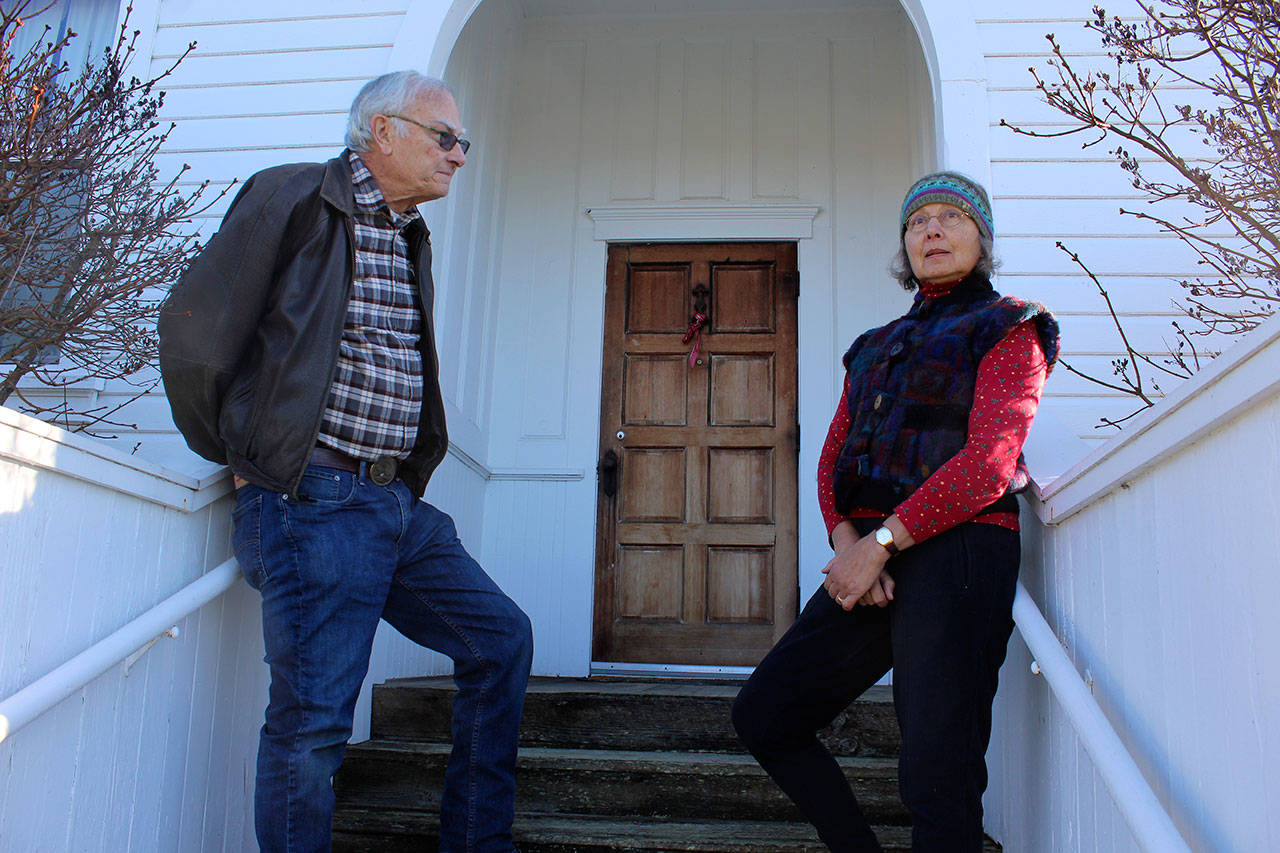The ghosts of Whidbey Island haunt local poets.
Ghosts of the beheaded, ghosts of sailors lost at sea, ghosts of native children, ghosts of species long gone.
Spirits are emerging as one unifying theme from a newly-formed organization aimed at bringing together North Whidbey poets and “becoming an intimate space for deep and cathartic listening.”
Called the Oak Harbor Poetry Project, the group meets monthly to feature readings from one local poet and open the floor to others wanting to read their work.
Its next meeting, 3 p.m. Sunday, Dec. 17, features Bill Skubi, who views poetry as a way to relay history and tell stories in a compelling manner.
“Poetry should remain local, like all politics should remain local,” said Skubi, who lives in Coupeville with his wife Jan Barrett Skubi, also a poet with family roots on Whidbey Island that go back generations.
Bill Skubi’s poem, “Where the Schoolhouse Stands at the End of Penn Cove,” recounts how local Native Americans were held in a fenced compound on the hill where the old San de Fuca school house now stands.
At the poetry reading, he plans to discuss how he learned about this episode of 1850s history and how he imagined it through the eyes of a young girl who wonders why her people are trapped near the water, freezing and dying, but unable to get to the water.
“In that first cold winter on the hill/We begged for wood to burn, stole the cedar wood of broken canoes/ And burned the magic of the people for a tiny bit of warmth.”
The Oak Harbor Poetry Project was founded by Daniel Moore and his wife, Laura Coe Moore, both poets who moved to Oak Harbor last December from Coupeville.
“We wanted to help create and sustain a vibrant poetic community that we have been part of for many years no matter where we lived, and since we didn’t find it in Oak Harbor it was our responsibility to make it happen,” Daniel Moore said.
Moore said he also wanted to dispel the “delusional belief that all real artists live on the south end of Whidbey Island.”
Both Moore and his wife have poems published in many poetry journals. One of his poems, “A Ghost Minority,” about Coupeville, was selected earlier this year to represent Whidbey Island in a Washington State poetry anthology.
But the Oak Harbor Poetry Project isn’t designed to be an exclusive club for pretentious poetry Poindexters.
“We are radically inclusive and welcome all poets at any place on their path from all walks of life. The last thing we want is conformity of any kind,” Moore emphasized. “We’ve heard poets do work about the art of compost to recovering from religious trauma to healing from watching an autopsy being done.”
Moore said he’d be thrilled to hear from military members and “how poetry has helped them to translate their experience of patriotism, family, loss and being in combat.”
Bill Skubi’s poems come from decades of visiting and living on Whidbey Island. Growing up in Seattle, his family visited every summer for five weeks staying at the same Useless Bay cabin, spending days fishing, boating, roaming the tidal flats.
He remembers how Blackfish, a species distinct from orcas, were once so plentiful in local waters that they were used as target practice.
“The whale experts of today are oblivious to the Blackfish because they have never seen them,” says Skubi. “That is the work of the poet, to remember, to record, not as science but as experience.”
Aaron John Marek, a young man with an unusual resume of “deadly” jobs read his poems in October; Gina Mammano is scheduled for January.
Marek, who moved to Oak Harbor in 2014, also helped launch the Poetry Project. His many jobs and duties revolving around loss of life include military color guard, an embalming internship that led to directing a funeral home and investigating deaths as a deputy coroner.
But Marek insists he’s not a member of the “Dead Poets Society.”
And the Oak Harbor Poetry Project doesn’t meet in a cave as the young boarding school students did in the aforementioned movie.
“This is not death poetry, not in a morbid sense,” Marek said. “There’s across all my work the idea of life being fleeting.
“No one has any idea when they are going to go. You may not want to dwell on that but be reminded you should live your life to the fullest.”
Or as the Roman poet Horace put it:
Carpe Diem.
• The Oak Harbor Poetry Project is open to all. It meets the third Sunday of the month at Harlow Hayes Hall next to the Oak Harbor Library, 1000 SE Regatta Dr, Oak Harbor. Next meeting is 3 p.m. Sunday, Dec. 17.



